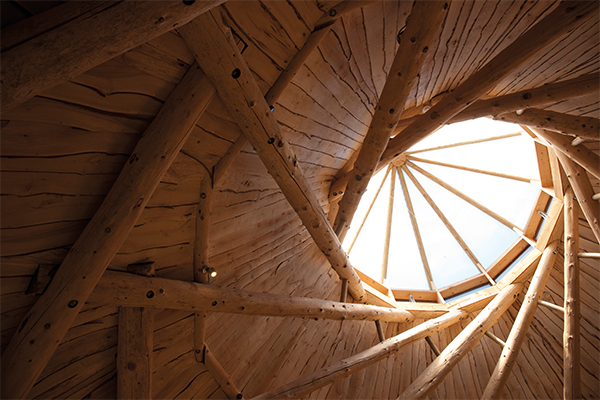Why Choose Lincoln
Supported by research groups
Opportunities for fieldwork
Learn from subject specialists
Research and practice pathways

This MA programme is designed for art, architecture, and design graduates who wish to specialise in creative approaches to the making of interior.
The design studio is the vehicle for the delivery of a teaching and learning strategy which is largely project-based. This allows for the presentation of the studio as a simulated interior architecture and design consultancy. Students act as design associates in a firm with an established ethos, knowledge base, culture, documentation standards, and design approach under the direction of a team of managers.
The second year takes this approach further and will be spent working full-time in an interiors practice offering an opportunity to utilise your skills and knowledge while gaining valuable industry experience and contacts.
A one-year version of this course is also available. Visit https://www.lincoln.ac.uk/course/inardsma/ for more details.
Supported by research groups
Opportunities for fieldwork
Learn from subject specialists
Research and practice pathways

MA Interior Architecture and Design is a full-time course with intakes in October and February.
All students enrol on the Master's programme. You may then elect to take a stage qualification or pursue the full programme. The full programme comprises of four compulsory modules. There are no elective modules.
The programme offers two pathways: Treatise by Practice and Treatise by Research; both pathways are designed to provide a platform to progress to further employment in interior consultancies or to advanced study at doctoral level. In both pathways, students will partake in research and design activities.
Postgraduate-level study involves a significant proportion of independent study, exploring the material covered in studio, lectures, and seminars. As a general guide, for every hour spent in class, students are expected to spend at least three hours in independent study. This is a full-time programme and students are expected to dedicate 40 hour per week to the course. For more detailed information, please contact the Programme Leader.
Delivery:
Contact Sessions (25%)
- Seminar: a classroom session focussing on a particular topic or project; typically a tutor-led group discussion.
- Tutorial: a meeting involving one-to-one supervision, with feedback or detailed discussion. Students must be prepared and bring discussion points/agenda items and project management documentation.
- Supervised work: students work independently but under supervision in a studio.
- Peer-to-peer: students explain their ideas to each other and participate in shared learning/working activities.
- Charrettes: students participate in directed design activities/exercises under supervision.
Self-directed learning (75%)
- Fieldwork: practical work conducted at an external site; such as building surveys, accessing archival information (physical and digital), and other forms of data collection.
- Projects: students plan and execute their own projects.
- Library: students conduct independent reviews of subject literature in the library.
- E-learning: students complete prescribed online learning activities in their own time.
Studio meetings take place on Mondays, and studio work on Fridays. Research seminars are presented on a Monday for the first six weeks in Term 1 and 2. These are supported with theory seminars for the first six weeks in Term 1 and 2. Fieldwork and self-directed study is scheduled for the remainder.
† Some courses may offer optional modules. The availability of optional modules may vary from year to year and will be subject to minimum student numbers being achieved. This means that the availability of specific optional modules cannot be guaranteed. Optional module selection may also be affected by staff availability.
We want you to have all the information you need to make an informed decision on where and what you want to study. In addition to the information provided on this course page, our What You Need to Know page offers explanations on key topics including programme validation/revalidation, additional costs, contact hours, and our return to face-to-face teaching.
Alongside giving students the opportunity to develop their own projects, the course is supported by the research endeavour of the Critical Heritage and Place Consumption Research Group. The group considers places, pasts, and traditions in contemporary life alongside heritage’s traditional concerns with conservation and restoration.
Explore Research
The design process utilised on the course is based on the imaginal strategy defined by Konigk (2015) and Scott’s (2008) process of altering architecture.
The programme is focused on the critical response to cultural heritage: students produce contemporary and progressive interior outputs. All modes of alteration (installation, insertion, intervention) and additions are possible, but preservation and new build is prohibited. The emphasis is on change of use adaptive-reuse (which distinguishes interior architecture and design from conservation and architecture).
Formative assessment occurs regularly throughout the programme by means of student critiques, draft written assignments, and progress reviews. Summative assessment is via project presentation supported by written project documentation.
Assessment Feedback
The University of Lincoln's policy on assessment feedback aims to ensure that academics will return in-course assessments to you promptly - usually within 15 working days after the submission date.
Postgraduate Application Support
Applying for a postgraduate programme at Lincoln is easy. Find out more about the application process and what you'll need to complete on our How to Apply page. Here, you'll also be able to find out more about the entry requirements we accept and how to contact us for dedicated support during the process.
How to Apply
First or second class honours degree or equivalent professional experience.
If you have studied outside of the UK, and are unsure whether your qualification meets the above requirements, please visit our country pages https://www.lincoln.ac.uk/home/studywithus/internationalstudents/entryrequirementsandyourcountry/ for information on equivalent qualifications.
Overseas students will be required to demonstrate English language proficiency equivalent to IELTS 6.0 overall, with a minimum of 5.5 in each element. For information regarding other English language qualifications we accept, please visit the English Requirements page https://www.lincoln.ac.uk/home/studywithus/internationalstudents/englishlanguagerequirementsandsupport/englishlanguagerequirements/.
If you do not meet the above IELTS requirements, you may be able to take part in one of our Pre-session English and Academic Study Skills courses. https://www.lincoln.ac.uk/home/studywithus/internationalstudents/englishlanguagerequirementsandsupport/pre-sessionalenglishandacademicstudyskills/ . These specialist courses are designed to help students meet the English language requirements for their intended programme of study.
You will need to have funding in place for your studies before you arrive at the University. Our fees vary depending on the course, mode of study, and whether you are a UK or international student. You can view the breakdown of fees for this programme below.
The University offers a range of merit-based, subject-specific, and country-focused scholarships for UK and international students. To help support students from outside of the UK, we offer a number of international scholarships which range from £1,000 up to the value of 50 per cent of tuition fees. For full details and information about eligibility, visit our scholarships and bursaries pages.
For each course you may find that there are additional costs. These may be with regard to the specific clothing, materials or equipment required. Some courses provide opportunities for you to undertake field work or field trips. Where these are compulsory, the cost for travel and accommodation will be covered by the University and so is included in your fee. Where these are optional, you will normally be required to pay your own transport, accommodation, and general living costs.
There are additional costs associated with this course. These will vary depending on the scope and ambition of the research and practice carried out by each student on the programme
With regards to text books, the University provides students who enrol with a comprehensive reading list and you will find that our extensive library holds either material or virtual versions of the core texts that you are required to read. However, you may prefer to purchase some of these for yourself and you will be responsible for this cost.
Postgraduate Funding Options
Find out more about the optional available to support your postgraduate study, from Master's Loans to scholarship opportunities. You can also find out more about how to pay your fees and access support from our helpful advisors.
Explore Funding Options
The programme offers two pathways: Treatise by Practice and Treatise by Research. Both pathways are designed to provide a platform to progress to further employment in interior consultancies or to advanced study at doctoral level.
The treatise that is prepared as the result of the practice route displays the characteristics of a ‘professional master’s degree’ as defined by the QAA (2015:5): it aims to enable graduates to qualify for entry into the profession of interior design (this may be subject to the requirements of the profession in various jurisdictions) and to provide development opportunities related to advanced employment in interior design.
The treatise that is prepared as the result of the research route displays the characteristics of an ‘advanced study master’s degree’ as defined by the QAA (2015:4): it aims to prepare graduates to advance their careers through further academic or professional study or for entering employment of a different kind in interior design.
To get a real feel for what it is like to study at the University of Lincoln, we hold a number of dedicated postgraduate events and activities throughout the year for you to take part in.
Upcoming Postgraduate Events